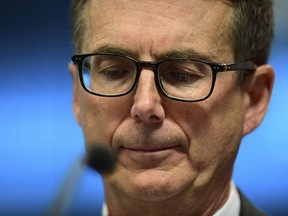Central bank’s rate increase breathes new life into most aggressive hiking cycle in recent memory
Article content
In a span of a couple of months, talk about Canada’s economy has gone from recession worries and interest rate cuts to things being too hot to handle.
Advertisement 2
Article content
Last week, Statistics Canada released GDP data that showed a much more resilient economy at the start of 2023 than anyone anticipated only a few months ago. All this amidst a reheating housing market and indefatigable labour market.
Article content
On Wednesday, Bank of Canada Governor Tiff Macklem signalled his patience had come to an end.
After keeping borrowing costs on hold for five months, central bank officials raised their policy rate by one quarter of a percentage point, and breathed new life into what was already one of the most aggressive monetary policy tightening cycles ever.
Overnight, tens of thousands of households and small businesses became poorer with the real prospect of even more hikes to come.
The sudden swing in the policy landscape illustrates the extent to which uncertainty remains the order of the day for the nation’s economic picture, making it tough to assess the outlook with much conviction.
Article content
Advertisement 3
Article content
Suggesting otherwise implies a precision to policy right now that doesn’t appear to be available to decision makers.
For the Bank of Canada, that means dampening expectations they can fine-tune their way out of last year’s inflationary crisis. Wednesday’s rate hike and hawkish policy statement reflect a change of tone in that direction.
Throughout their hiking cycle, central bank officials held to the optimistic idea the economy would be able to break its inflation fever in relatively smooth fashion.
Their strategy was to start the cycle with some shock-and-awe — which they did — hoping it would bolster public confidence in their seriousness to tackle price pressures. Keeping inflation expectations in check would in turn reduce wage demands and prompt companies to hold back on price increases.
Advertisement 4
Article content
The rapid rise in borrowing costs, meanwhile, would also have the direct effect of cooling consumer spending just enough to bring the economy back into balance. It was all very Goldilocks.
But clearly, the economic tailwinds have been more significant than expected despite the higher-rate environment.
These tailwinds include a massive build-up of savings during the pandemic that consumers are activating, strong demand for our resources and an incredibly fast-growing population that is juicing up demand.
The Bank of Canada is beginning to worry it’s no longer on track to return consumer price inflation back to its two per cent target.
“Concerns have increased that CPI inflation could get stuck materially above the two per cent target,” Bank of Canada officials said in their policy statement, while adding they remain optimistic inflation will continue to come down in coming months.
Advertisement 5
Article content
In hindsight, while few economists predicted Wednesday’s rate hike, Macklem was running out of options. After failing to predict the surge in prices in the first place, the Bank of Canada’s credibility has been hanging on a thread and it can’t afford to be seen to be behind the inflation curve.
And it’s very possible Macklem will need to hike again in order to complete the job. But how far he is really prepared to go remains an open question.
-

Trudeau can’t keep juicing the economy with more spending
-

Why economists — not politicians — are raising alarms around immigration
-

Bank of Canada just ‘stomped’ on the housing market rebound
There’s no precedent of a major disinflationary period — like the Bank of Canada is trying to achieve — without at least some type of demand-induced recession. Still, the central bank has conveyed a largely optimistic message throughout.
Things may be different this time, but maybe they won’t.
Will Macklem maintain a two-per-cent-inflation-or-bust mindset no matter the economic implications? That’s to be determined, but paring back expectations of best case outcomes will be one signal he’s serious.
Theo Argitis is managing partner at Compass Rose Group
Article content
Bank of Canada fighting to stay ahead of the inflation curve
2023-06-08 10:13:34







Comments
Postmedia is committed to maintaining a lively but civil forum for discussion and encourage all readers to share their views on our articles. Comments may take up to an hour for moderation before appearing on the site. We ask you to keep your comments relevant and respectful. We have enabled email notifications—you will now receive an email if you receive a reply to your comment, there is an update to a comment thread you follow or if a user you follow comments. Visit our Community Guidelines for more information and details on how to adjust your email settings.
Join the Conversation